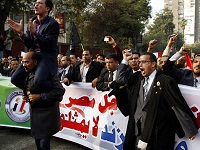Court of Egypt against new Constitution
Egyptian authorities are accelerating the adoption of the Constitution. On November 30th the draft of the document was approved by the Constitutional Assembly. President Mohamed Mursi and his supporters are hoping that after the referendum on December 15 the political crisis will be overcome. However, the opposition and judges opposed the draft of the Constitution of the "Muslim Brotherhood" and other Islamist parties.
After winning the Islamists were able to make key decisions in the Parliament of Egypt. The Constituent Assembly was formed mainly of representatives of Islamist parties. Under these conditions, the few supporters of the opposition could not count on full participation in the drafting of the Constitution and deliberately left the Assembly. Now at the referendum the "Muslim Brotherhood" and its allies intend to support the draft of the basic law approved by Mursi, maintaining the law of Sharia Egypt.

Under the new Constitution, the President will be elected for no more than two four-year terms. The President cannot declare a war without the support of the National Defense Council and the Parliament. In addition, the new Constitution is designed to consolidate revolutionary gains. In particular, the former National Democratic Party that ruled for many years will not have the right to hold public office in the coming years. However, some articles in the text of the Constitution remained unchanged. Islam still retains the status of the state religion in the country, and the Arabic language is called the state language.
Mohammed Mursi was elected President of Egypt in June of 2012. The candidate from the Muslim Brotherhood secured 51.7 percent of votes, while his rival, former Prime Minister Ahmed Shafiq, received 48.3 percent of votes. The first since the overthrow of Hosni Mubarak's presidential elections were accompanied by thousands of rallies across the country. Immediately after the announcement of the election results, Mursi left the Islamist movement the "Muslim Brotherhood" and promised his fellow citizens to become the "President of all Egyptians."
In late November riots broke out again in Cairo due to the adoption of an ambiguous constitutional declaration. According to this document, President Mursi was granted special legislative powers. Now his decrees cannot be appealed by any court. This careless step of the President caused much disappointment among many ordinary citizens fearing another dictatorship.
Riots that swept the country killed three people; several hundred were injured in clashes with police. Meanwhile, the highest court of Egypt went on strike to protest against the constitutional declaration that substantially limits the judicial power.
The situation in Egypt escalated further when President Mursi accused the courts of an attempt to overthrow the government. The Constitutional Court of Egypt was forced to postpone consideration of cases of the President's legislative initiatives. The meeting, scheduled for December 2nd, was postponed because Mursi's supporters blocked the entrance to the courthouse. Chief Justice Maher Al-Beheira did not specify when a regular meeting on the matter will be held. If the Constitutional Court recognizes illegal actions of Mursi, Egypt will face a political crisis.
According to the presidential declaration, no decisions of the Constitutional Commission that developed the new Constitution of Egypt can be appealed. Accordingly, there will be a question of legitimacy of one of the two branches of government - the President or the Constitutional Court, wrote Israeli online portal Cursor.
According to Mignews.com, Mursi in his speech about the basic law of the country said that the President's authority was limited for the first time in Egypt's history. Mohammed Mursi said that the President could dissolve the Parliament only if it is approved at a referendum. If his offer is rejected, he would step down.
Despite numerous protests by the opposition, a referendum on the constitution will still be held on December 15. If the basic law is adopted, the referendum in Egypt will be followed by general election to the Parliament. However, a positive outcome of the vote on the draft Constitution that mainly meets the interests of the Islamists does not guarantee stabilization of the political situation in the country.
Yuri Sosinsky-Semikhat
Pravda.Ru
Subscribe to Pravda.Ru Telegram channel, Facebook, RSS!




